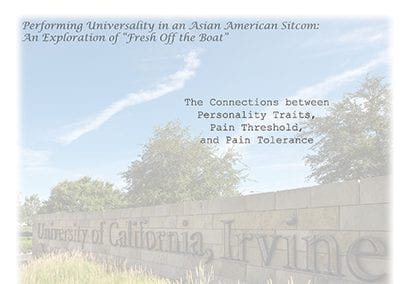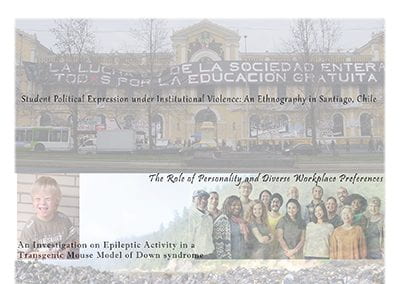UCI Undergraduate Journal: Volume I, 1998
1998 Published Papers
- The MorphoSys Project: Dynamically Reconfigurable Computer Architecture U-Tee Cheah
- Error Control for Video on Demand Over ATM Network Chin-Yu Chen
- Degrees of Reality in the Republic Robert Elkins
- The Common Heritage Doctrine and the Treatment of Cultural Property: History, Theory, and Practice Alexander Frid
- Effects of the D1-Antagonist SCH23390 and the D2-Antagonist Eticopride on Self-Administration of the D1-Agonist SKF82958 Mohammad Helmy
- Bispectral Analysis of EEG Waves Provides an Objective Method of Determining Sedation Level in Intensive Care Unit Patients Susan Khera
- Cross-Language Transfer of Phonemic Awareness in Spanish and English Bilinguals Van Thanh Le
- Determination of Functionally Relevant Cell-Type Specific Differences in Heparan Sulfate Glycanation Huy Pham
- The World is a Stage: Theatricality, Conventionaltiy, and the Role-Playing of Charlotte Charke Priya Shah
- Northern Ireland–National Identity and the Politics of Non-Participation: The Creation, Maintenance, and End to Catholic Subordination Charles Shivers
- Neurotrophin Expression in the Developing Olfactory System Kavita Singh
- Women’s Choices in the Western World: A Comparative Analysis of Western Abortion and Maternal Welfare Policies Johanna Wilson
- A Creative Endeavor by the UCI Etude Ensemble
A Letter from the Advisors
|
In a significant and sometimes critical commentary on the American research university, the recent report by the Boyer Commission approvingly quotes John Dewey: “Learning is based on discovery guided by mentoring, rather than on the transmission of information.” We share Dewey’s view and the powerfully argued position of the Boyer Commission regarding the central value of inquiry-based learning in the education of undergraduates. Given the shape of knowledge and work as we enter the 21st century, it is essential that our students have skills and intellectual initiative that go beyond what is typically nurtured in conventional classroom learning. We believe that involvement with leading-edge research helps students to gain experience in the continuous and self-directed learning that will be core qualities of those individuals most successful in knowledge creation, diffusion and utilization. The rapid rise of the University of California, Irvine to the select group of world-class research universities is attributable, inter alia, to our top-quality faculty, facilities, and environment of knowledge creation. Our undergraduates have long been integral participants in the research that is the hallmark of UCI’s distinction. Faculty-mentored research, in which students themselves develop and complete projects, is one of the most significant modes of such participation. At UCI’s annual Undergraduate Research Symposium, more than 200 undergraduates present their work in a professional conference setting. In addition, many of UCI’s schools and departments have their own arenas for the presentation of students’ research and creative activities. We have established The UCI Undergraduate Research Journal to provide another medium through which the best of undergraduate research can be showcased and shared with a broader audience. We hope that you will find the research in this Journal to be engaging, and that this sampler of our undergraduates’ research will offer some insights regarding the variety of work being undertaken by UCI students. Should you wish to explore our activities more extensively, one place to begin is at the Website for our Undergraduate Research Opportunities Program (http://www.urop.uci.edu). The Journal owes its existence to many people, but some merit special recognition. First, we acknowledge the undergraduate authors and their faculty mentors. Their collaborations and relationships led directly to the completion of the research included in this Journal. Secondly, we thank the UROP Student Editorial Board who not only created the guidelines for this inaugural volume, but also were central in the review, editorial, and design processes through which the Journal was produced. This Journal is very much a student-based product. Third, we are grateful to the UROP Faculty Advisory Board, whose distinguished members provided final evaluation of the papers selected for publication. And fourth, we acknowledge the hundreds of UCI students and faculty who collaborate each year in undergraduate research projects. It is from this extensive and diverse array of research activities that we offer a small sample in this Journal issue. We welcome your comments on this initial volume of The UCI Undergraduate Research Journal.
|
A Letter from the UROP Student Editorial Board
Journal Advisors
| James N. Danziger Dean, Division of Undergraduate Education |
Said M. Shokair Director, UROP |
|
UROP Faculty Advisory Board Professor Roxane Cohen Silver |
UROP Student Editorial Board Jennifer LaFemina, Chief Editor |
|
UROP Student Production Staff Saquib Rashid, Hard Copy Layout |
~Letter from the UROP Student Editorial Board~
Research is an integral part of undergraduate education, particularly at the University of California, Irvine, an institution that not only invests in and prizes undergraduate education, but also maintains its prestige as a leading research university in the world. We, the UROP Student Journal Editorial Board, took the opportunity to launch this inaugural volume in order to showcase some of the high-caliber work and research endeavors completed by our fellow undergraduates. More importantly, though, we wanted to highlight the successful relationships that have been cultivated between students and faculty that were made possible through faculty-mentored research endeavors.
After being given the opportunity to create what is going to be a new tradition here at UC Irvine, the Student Board–a group of 10 undergraduates from all disciplines at the University–were not only able to recognize the student and faculty contributions to research, but also to facilitate their recognition through a unique medium. Months of research, dynamic communication, and passionate exchange resulted in the Journal that you are about to read. We have spent excessive time not only in a detailed editing process–to perfect both the presentation of grammar and figures–but also, in an intricate design process, to make the Journal professional, yet personal. We feel we have achieved this goal, for not only do you, the audience, get a sample of high-caliber research, but you receive it through a medium that clearly showcases the students’ efforts and the faculty’s support.
We are proud of the Journal not only because we have successfully achieved our broad goals, but also because we have done so through a medium of which we are proud–proud because of the Journal’s uniqueness, proud because all undergraduates now have another means through which to transmit their work, and proud because the Journal will be a tradition of which this world-class research institution can be proud.
On behalf of the Board,
Jennifer LaFemina
Chief Editor




